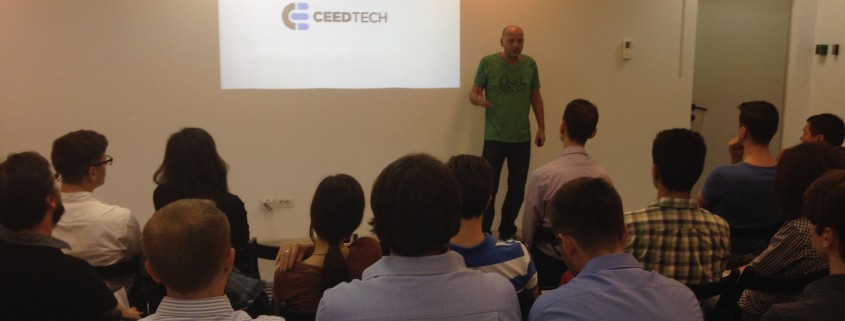StartupYard FastLanes 4 Companies from Bucharest
As part of our 6 city StartupYard FastLane tour, we visited TechHub Bucharest last week, “FastLaning” 4 companies, which is more than in any other city but Prague..” StartupYard has now FastLaned 15 companies in 4 cities, with two more cities, Krakow and Warsaw, coming up.
TechHub is an international ring of startup incubators, whose mission is to help startups “start up faster.” The space they have recently occupied near the center of Bucharest is perfect for startups. It’s compact, but with a comfortable atmosphere, and plenty of space for events, meetings, and work.
Energy And Atmosphere
Just as we had encountered in Kosovo and Bulgaria in the past few weeks, there is a very positive creative energy among Bucharest’s young startup community- a sense that anything is possible, and that growth and dynamism in the tech industry is just getting started.
Time to fine-tune those pitches & skip the line for the next @startupyard batch. Tonight @TechHubBuc pic.twitter.com/rXCc7Ubf5A
— TechHub Bucharest (@TechHubBuc) September 24, 2015
There was also a healthy variety to the pitches we heard, and the founders we talked with while visiting over several days. We heard pitches in e-health, gaming discovery, fintech, e-commerce, and IoT, among other domains. Each of these ideas was original, and not a local “me too” version of a popular global product. Of the entrepreneurs we talked with, most had a global focus, or at least an eye towards international markets, which showed that Romanian startups are gaining the confidence and the appetite for the world tech stage.
“Cheaper,” is not the Pitch
A pleasant surprise for me on this tour has been that “the cheaper version of X” has not been included in any of the pitches we’ve heard throughout Central and Eastern Europe. A stereotype of only a few years ago, that this region produces cheap knock-offs of popular concepts, banking on the lower costs of development and deployment to compete with international products on the local level, seems to be fading quickly.
The region is of course still cheaper to develop in and represents a strong pool of low-cost talent for western companies, but the startupers we’ve met this year are not as interested in carrying over this mentality into their startups. Instead, they’re focusing on the quality of their products, and their ability to compete head to head in the global market on innovation and creativity. There are probably still many local clones, and they have their place, but significantly, these are no longer the companies coming forward to apply for StartupYard.
It’s Still All About Communication
George Dita, of TechHub Bucharest, who has also invited StartupYard back to participate in HowToWeb’s Startup Spotlight in November, made an interesting comment while we chatted about the local startup scene. “You can see this progression from West to East,” he said: “If you start in the US, or UK, the sales and communication skills are the strongest, but as you move East, that goes away. In Eastern Europe, technical talent is incredible, but sales and marketing are missing.”
This observation has matched our experience so far, but that is in itself a great opportunity for StartupYard. We can act as a gateway for the amazing talent and the ambition of Central and Eastern European startups who lack the background, culturally and experientially, they need to compete with other global players. We see ourselves in that role even more these days, given the success of TeskaLabs, a StartupYard company that was recruited in TechStars London while still attending our program.
As we say, you can teach an engineer sales, but it’s much harder to teach a salesman how to think like an engineer. Startups in Central Europe have tech talent coming out of their ears. The only barrier to competing in the west is confidence and competence in communicating, and selling their ideas. We hope to continue replicating successes like TeskaLabs in the future.
We think it’s very important in today’s startupland to have sales and marketing as fundamental part of the team and the company from day one, but we can work with teams that need to foster that part of their business into something that really performs. They only have to get why it matters, in order to learn how to do it. That is a transition we have seen happen with startups from this region.
What we see, time and again, is entrepreneurs who can’t communicate their ideas effectively, but more and more, we see that they are aware of this, and are working hard to get better at it. That tells us that there are many exciting things coming up from Eastern Europe in the future, and we’re excited to be in the middle of the transformation.




